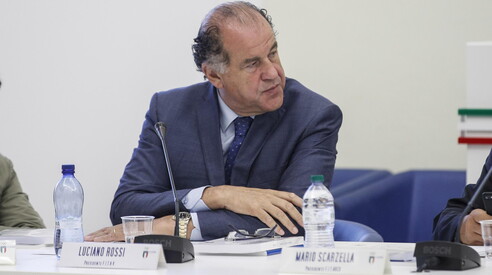The head of the Italian Shooting Federation explains the risks of dismantling the sport.


Ansa photo
the interview
"Let's all take a step back to take a leap forward," says Luciano Rossi – president of Fitav – speaking of the risks to sporting autonomy and respect for the role of federations.
On the same topic:
“Let's not let ourselves be trampled on, we demand respect.” More than a warning, it's a warning to sailors, from a sea—the colorful, complex world of sports politics—that he's always frequented. His father was president of the Umbrian National Olympic Committee for thirty years, he has led the Italian Clay Pigeon Shooting Federation for thirty-two years, and since 2022, he has also presided over the World Federation. But Luciano Rossi , 72, from Foligno, an entrepreneur, was also a member of parliament and senator, until 2018, with Forza Italia, People of Freedom, and the New Center-Right. And he continues to identify with that political arena. This is why his words leave a deep impression, like certain paternal caresses. They fit into the debate on sport and politics, or rather, politics in sport, that the end of the Malagò era, the election of Buonfiglio as his successor, and the recent government attempts—partially blocked by the Quirinale—to establish by law a role for Sport and Health in the governance of sporting events, have generated . It's a message that has many audiences, in both directions: that of politics, "which must treat sport with the same respect it receives," and of sport, "which must go beyond personal selfishness: my colleagues, put aside federal conveniences in the name of the common good: let's all take a step back to take a leap forward."
The Italian Clay Pigeon Shooting Federation, with its twenty-two thousand active members, is a small but significant entity in Italian sport . It's probably one of those entities that someone would easily erase, but if we took into account an aspect that rarely emerges in the debate—"namely," Rossi recalls, "the fundamental social function that federations perform, which alone would justify a state contribution"—a glorious piece of Italian sport's glorious history would be erased: from 1900 to last year, in fact, Italian clay pigeon shooting has won 33 medals (12 gold, 13 silver, 8 bronze), second only to the United States in the medal table, in a ranking that includes 44 countries. Luciano Rossi's reasoning is based on two assumptions. The first: "Italian sport is a source of excellence. The world is identified with our Olympic Committee, unanimously considered the best sports organization in existence. The Italian National Olympic Committee (CONI) has had great presidents, all highly respected. Under the leadership of Giovanni Malagò, whom I supported until the very end, Italian sport has acquired unprecedented international credibility. So, if one may ask, why do they want to supplant this system? To harm us? Or continue to harm the hundreds of thousands of sports clubs that are on their knees due to the economic crisis and some recently enacted reforms, such as the one on sports employment?" The second: "Italian sport has never had so many resources, and for this we have Minister Giorgetti to thank in particular. It's right that the state wants to monitor how this money is spent, but it already does. If it now wants to manage those resources, replacing the federations, then the numbers no longer add up."
This is the case with the tennis finals, on which Rossi offers a personal comment: "I'm convinced that President Binaghi, whom I consider an enlightened leader, now understands when Malagò said 'be careful, today it's the turn of this federation, tomorrow that one, and the day after tomorrow it's the entire CONI,' but they say there's none so deaf as he who won't hear." And a political reflection: "I respectfully ask what the mission of Sport e Salute is: that of an organization promoting correct and healthy lifestyles, or that of an organizer of sporting events. The resources it allocates should be used to support sports clubs and should always be allocated in a straightforward and transparent manner. We at Fitav, for example, were excluded from the last tender for twenty million euros, but then, from one day to the next, we're asked to pay rent..." All this leads the Fitav president to say that "we're going through a difficult time, but I remain confident that the government, made up of intelligent people, will be able to take a step back, believing that diversity, if there is mutual respect, is a great opportunity." Certainly, CONI will never be the same. "There's no doubt about it, but Luciano Buonfiglio is a capable and respectable leader; we must protect and support him. Confirming Carlo Mornati as secretary was the best way to get started; if CONI is so credible today, it's thanks in part to him." And then, sport always has an ace up its sleeve. His name is Sergio Mattarella. "A President who has never failed to show us his extraordinary support." Yes. Even in these dark hours.
More on these topics:
ilmanifesto

